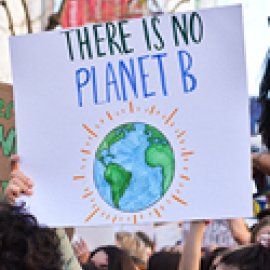Ecological Overshoot, part one
-
English
-
ListenPause
[intro music]
Welcome to World Ocean Observatory
I’m Peter Neill, Director of the World Ocean Observatory
With the conclusion of COP-28, the meeting of the Parties to advance the international response to changing climate, amidst all the celebration, spin, justification, and disappointment, there is a strange sense of paradox at work – the need to shape a success from what might well be called a failure, the compulsion to put the best face forward on a meeting that, hosted and attended by thousands of representative of the energy companies and associated corporations, called for “phase down” or “phase out” of our use of fossil fuels, an equivocation characterized by some as a victory, and by others as worse than just a defeat. Many of the attendees, mostly the corporate types and their leaders, adjourned to the World Economic Forum in Davos, Switzerland, where all sanctimony and nuance was put aside for an overt affirmation of the status quo and the ascendency of capital and consumption no matter how you try to call it something else. Much of the press coverage of both events had much to do with celebrity, sumptuous spread, inventive cocktail, and hobnobbing with their peers.
Call it what you will. Many millions of dollars were pledged to solutions, many best intentions declared, all in the context of the embarrassing under-performance of such funds, and the same funders, the last time around. The carbon footprint of the event was astonishing – corporate and private business jets, limousines and helicopters from hotel to podium, bars and buffets that seemed to captivate many of the journalists reporting, as it were, from the front lines of progress.
The focus seemed entirely on carbon emissions and associated response: wind turbines, solar farms, alternative technologies, carbon capture, offsets, and markets – all the same elements of a global conversation that has echoed and reverberated as a responsible, effective, adequate response to the climate challenge, uncomfortably more evident as storm, flood, and fire engulf inland and coastal communities worldwide. As the UN Secretary General continues to intone, it is all “too little, too late,” buts so it goes., tunnel vision that is just not good enough to see the light before the end.
There is a group of onery, outspoken ecologists, scientists and economists who advocate a broader look: measuring the carrying capacity of the earth and all its ecological systems within planetary boundaries beyond just climate change, to include bio-spheric integrity, land system change, freshwater change, bio-geochemical flows, ocean acidification, aerosol loading, stratospheric ozone depletion, and novel entities such as micro-plastics, endocrine disrupters, and organic pollutants. It is just so much more complicated, so much worse, so much more urgently real, that we are approaching the limits of earth’s ecological capacity to support us, depleting resources with no comparable regeneration, approaching what in examples of other species under such duress has resulted in collapse. Even the best and the brightest, in Dubai and Davos, can’t, or won’t wrap their brains around the threat of deficit consumption of natural asset value as a path to global bankruptcy without redress.
This is as hard to write as it is hard to hear. Anger does not suffice; denial seems no better way. Every time I get to this place, I think of my three grand-sons, 1 to 7 years old, and completely unaware of any of this doom-speak and future fear. Each of us chooses a way forward, and around us, and around the world, there are hundreds, indeed millions, who are resolved to do something to address the prospect and change it. I think of Greta Thunberg who for five years has stood against the energy complex and for alternative innovation and environmental justice against a torrent of abuse, arrest, and social media ridicule for speaking out for all of us and our future. But, more and more, she is not alone, witness the constant meeting and messaging about climate response in our communities, our state, and even in our nation. There are more and more organizations and individuals committed to speaking out, challenging the old values, structures, and behaviors that perpetuate the problem.
The question may be no more: what will it take? but rather: will it be enough?
We will discuss these issues, and more, in future editions of World Ocean Radio.
[outro music]
In this episode and the next, World Ocean Radio reports on the status quo, business-as-usual, tunnel vision conclusions at COP28 in Dubai, hosted by the United Arab Emirates, December 2023. While many millions of dollars and intentions were pledged toward solutions, the focus and associated response was too narrow and inadequate to address the deficit consumption of our world's natural and ecological resources.
> Ecological Overshoot, part one
About World Ocean Radio
World Ocean Radio is a weekly series of five-minute audio essays available for syndicated use at no cost by college and community radio stations worldwide. Peter Neill, Director of the World Ocean Observatory and host of World Ocean Radio, provides coverage of a broad spectrum of ocean issues from science and education to advocacy and exemplary projects.
World Ocean Radio
14 Years, 700+ Episodes
Ocean is climate
Climate is ocean
The sea connects all things
- Login to post comments



